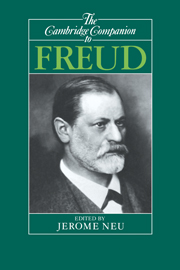Book contents
- Frontmatter
- Introduction
- 1 Freud: The psychoarcheology of civilizations
- 2 Seduced and abandoned: The rise and fall of Freud's seduction theory
- 3 Freud's androids
- 4 The interpretation of dreams
- 5 The unconscious
- 6 The development and vicissitudes of Freud's ideas on the Oedipus complex
- 7 Freud and perversion
- 8 Morality and the internalized other
- 9 Freud on women
- 10 Freud and the understanding of art
- 11 Freud's anthropology A reading of the “cultural books”
- 12 Freud's later theory of civilization
- 13 In fairness to Freud: A critical notice of The Foundations of Psychoanalysis, by Adolf Grünbaum
- Bibliography
- Cited works of Freud
- Index
- Series list
13 - In fairness to Freud: A critical notice of The Foundations of Psychoanalysis, by Adolf Grünbaum
Published online by Cambridge University Press: 28 May 2006
- Frontmatter
- Introduction
- 1 Freud: The psychoarcheology of civilizations
- 2 Seduced and abandoned: The rise and fall of Freud's seduction theory
- 3 Freud's androids
- 4 The interpretation of dreams
- 5 The unconscious
- 6 The development and vicissitudes of Freud's ideas on the Oedipus complex
- 7 Freud and perversion
- 8 Morality and the internalized other
- 9 Freud on women
- 10 Freud and the understanding of art
- 11 Freud's anthropology A reading of the “cultural books”
- 12 Freud's later theory of civilization
- 13 In fairness to Freud: A critical notice of The Foundations of Psychoanalysis, by Adolf Grünbaum
- Bibliography
- Cited works of Freud
- Index
- Series list
Summary
Adolf Griinbaum's provocative book, The Foundations of Psychoanalysis, was quickly accorded an impressive reception. His earlier critical pieces on the subject caused a stir among their audiences, audiences that included philosophers, psychoanalysts, and other interested persons. As was expected, some of the pieces were incorporated in the book; indeed, because of them, its appearance had been anticipated with feelings that ranged from glee to dismay. Neither of those extreme feelings, however, has obtruded on the respectful tone of most of the book's wide notice. There are several reasons for that tone. Among them is Griinbaum's familiarity with important phases of Freud's work, especially those leading up to the public inception of psychoanalysis at the beginning of the century. Griinbaum's book also displays an acquaintance with a variety of Freud's later writings and with post-Freudian psychoanalytic developments. In addition it furnishes a compendium of the criticisms Freud's thought has evoked. Also, for interesting but disproportionate measure, a third of the book indicts hermeneutic construals of Freud, notably those of Habermas and Ricoeur. Finally, but surely not least, Griinbaum brings to those topics and related ones a rare discursive and polemical tirelessness.
- Type
- Chapter
- Information
- The Cambridge Companion to Freud , pp. 309 - 338Publisher: Cambridge University PressPrint publication year: 1991
- 1
- Cited by

